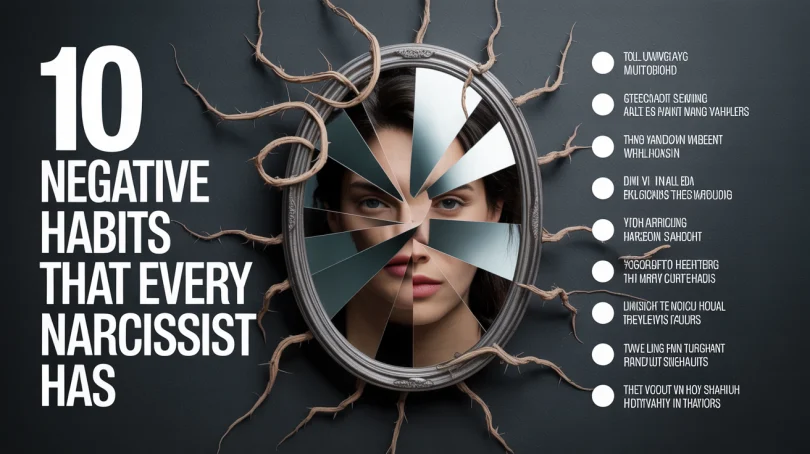Narcissist relationships are labyrinths without an exit, toxic but difficult to leave. They exhibit cyclical patterns from their desire for control and validation. Knowledge of these patterns is the key to taking back your emotional well-being. In the next section, we will reveal the 10 negative narcissist habits, why they are so destructive, and how you can begin to put yourself first.
Why Narcissistic Behaviors Matter
Narcissists don’t act this way by accident. Their behaviors are part of a pattern designed to maintain control and feed their emotional needs. Trying to change a narcissist is like chasing an illusion; they’re wired to prioritize themselves. Staying in such a relationship often leads to exhaustion, self-doubt, and emotional dependence. The good news? You have the power to break this cycle by recognizing these habits and choosing to prioritize your well-being.
1. The Need to Always Be Ahead
Narcissists crave the spotlight, no matter the occasion. Whether it’s a casual conversation or a major event, they’ll redirect attention to themselves. Share a personal achievement? They’ll interrupt with a bigger, better story. This isn’t just vanity, it’s a compulsion to dominate. Over time, this minimizes your accomplishments and reinforces their control, leaving you feeling sidelined.
Reflection: Do you notice someone constantly stealing your moment? Recognize this as a sign of their need for control, not a reflection of your worth.
Related Topics:
5 Weird Texting Habits Of Narcissists
10 Questions A NARCISSIST Simply Cannot Answer
How to EXPOSE a NARCISSIST with One Powerful QUESTION?
2. Ruining Special Occasions
Ever planned a celebration only to have it derailed by drama? Narcissists take pleasure in sabotaging moments of joy, like birthdays or graduations. They might start arguments, create chaos, or withdraw entirely. Why? Your happiness threatens their sense of superiority. This behavior leaves you questioning your joy and dreading special moments.
Reflection: No one deserves to have their happiness destroyed. If special occasions consistently turn painful, it’s time to question the dynamic.
3. Prioritizing Strangers
One of the most confusing habits is how narcissists shower strangers with attention while neglecting those closest to them. They might lavish gifts or compliments on acquaintances, leaving you feeling inferior. This is a deliberate tactic to breed insecurity and keep you chasing their validation.
Reflection: Ask yourself why I am competing for scraps of attention? You deserve to be a priority, not an afterthought.
4. Inability to Answer Simple Questions
Ask a narcissist a direct question, and you’ll likely get evasion, deflection, or blame. This isn’t about poor communication, it’s a strategy to maintain control. By avoiding clear answers, they keep you confused and emotionally exhausted, reinforcing their dominance.
Reflection: Healthy relationships thrive on open dialogue. If someone consistently dodges your questions, it’s a red flag.
5. Setting Rules for Others, Not Themselves
Narcissists love imposing strict rules, don’t see certain friends, don’t act a certain way, but exempt themselves from the same standards. This double standard keeps you submissive while they act freely. It’s not about fairness; it’s about power.
Reflection: Why adjust your life to meet rules you don’t follow? Mutual respect is non-negotiable in healthy relationships.
6. Punitive Silent Treatment
The silent treatment is a cruel weapon. Narcissists use it to punish, control, and weaken you, cutting off communication to make you feel insignificant. This leaves you spiraling in self-doubt, desperate to reconnect. It’s not innocent, it’s manipulation.
Reflection: Silence that feels like punishment isn’t love. You deserve open, honest communication.
7. Blameshifting
Narcissists never admit fault. Instead, they shift blame onto you, even for things beyond your control. This creates a toxic environment where you’re constantly apologizing for their mistakes, doubting your sanity.
Reflection: Why carry the weight of someone else’s errors? Healthy relationships involve mutual accountability.
8. Creating Emotional Chaos
Narcissists thrive on chaos, projecting their inner turmoil onto you. They manufacture problems, exaggerate issues, or shift moods unpredictably, keeping you anxious and vulnerable. This chaos ensures you’re too busy fixing their problems to focus on yourself.
Reflection: You deserve peace. If you’re always navigating someone else’s storm, it’s time to step out.
9. Putting the Victim Down
Narcissists erode your self-esteem with constant criticism, making you feel you’ll never be enough. Remarks like “You’ll never succeed” or “No one else would want you” are designed to keep you dependent on their validation. This damages your confidence and traps you in the cycle.
Reflection: True love lifts you, not tears you down. Surround yourself with people who encourage your growth.
10. Compulsive Lying
Lying comes naturally to narcissists. They distort reality with such conviction that you question your perception, a tactic known as gaslighting. These lies manipulate and control, creating a warped reality where you can’t trust yourself.
Reflection: A relationship built on lies isn’t love, it’s manipulation. You deserve honesty and trust.
Breaking Free from the Toxic Cycle
Now that you recognize these habits, the next step is breaking free. Change starts with you, not the narcissist. They’re unlikely to change without professional help, so the question is: Why am I allowing this?
Steps to Reclaim Your Emotional Health
- Recognize Emotional Dependence: Reflect on why you tolerate toxic behavior. Often, it’s tied to childhood wounds or unmet needs. Understanding these patterns is key to breaking them.
- Set Clear Boundaries: Be firm about what you will and won’t accept. Boundaries are acts of self-love, not selfishness.
- Invest in Self-Love: Make conscious choices to prioritize your well-being. This might mean saying no to toxic people or pursuing your own goals.
- Seek Support: Therapy can help you understand your vulnerabilities and build healthier relationships. Support groups connect you with others who’ve faced similar challenges.
- Choose Healthy Relationships: Surround yourself with people who offer respect, balance, and mutual growth. You deserve partnerships built on genuine love.
You are not the problem. Narcissistic behaviors are about control, not your worth. By recognizing these habits and investing in yourself, you can break free from toxic cycles and build a life filled with peace and respect. Start today, set one boundary, seek one support resource, or simply ask yourself, What do I deserve? The answer is clear: You are light, and you deserve to shine.






